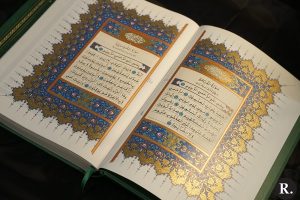EXCLUSIVE SERIALISATION
We proudly present the first full English translation of the commentary of Chapter 113, Sūrah al-Falaq, by Hazrat Mirza Bashiruddin Mahmud Ahmad (ra) from his magnum opus: Al-Tafsīr Al-Kabīr – The Grand Exegesis
In the previous edition, we began the commentary of verse 4 of Sūrah al-Falaq.
In this edition, commentary of this verse continues.
Translated by Murtaza Ahmad
Edited by The Review of Religions Translation Team

© Shutterstock
4) As previously stated in the exegesis of أَعُوذُ بِرَبِّ الْفَلَقِ مِنْ شَرِّ مَا خَلَقَ Allah has taught us a prayer to seek refuge with Him from the inherent defects that prevent one from attaining excellence. In the words, وَمِنْ شَرِّ غَاسِقٍ إِذَا وَقَبَ, we have been taught by Allah Almighty a supplication to protect us from a devastating outcome, because sometimes, although the beginning may be great, the end result can be terrible. Sometimes, one’s end is so untimely or inopportune that their righteousness, rather than enduring, is ruined. This is why this verse omits mention of the middle stage of life and refers to the end instead. That is to say, the words مِنْ شَرِّ مَا خَلَقَ refer to the initial phase of man’s life. Allah Almighty does not refer to the middle stage of human life; instead, He refers to the end phase of man’s life: وَمِنْ شَرِّ غَاسِقٍ إِذَا وَقَبَ This means, [‘I seek refuge with Allah] from the evils of when something falls into an abyss, disappears and is hidden from sight’ or in other words, from the consequences of when a man dies and is buried in the earth. [To put it another way, Allah Almighty has instructed man to supplicate:]
‘O my Lord, I seek refuge with You from the ill consequences of that time, just as I seek refuge from my inborn defects that prevent me from making progress. And similarly, I seek refuge with You from a situation in which my death results in such shortcomings that would harm the cause of religion or that my work is left unfinished, and ends badly instead of ending well.’
In this world, death can also lead to evil. In fact at times, man dies before completing a task, resulting in bad outcomes rather than good ones. Therefore, Allah Almighty instructs us to pray to Him so that we may also be safeguarded against the evil relating to one’s demise, i.e. the consequences that may occur after one’s death.
By the grace of Allah Almighty, Allah has given me the glad tidings that He will fulfil tasks for which I have been chosen and the end of my life will be extremely good. Thus, in 1942 Allah Almighty informed me through revelation:
مَوْتُ حَسَنٍ مَوْتٌ حَسَنٌ فِيْ وَقْتٍ حَسَنٍ
meaning, ‘the death of Ḥasan will be a most excellent [Ḥasan] death and it will come to pass at an excellent time.’ In this revelation, I have been declared the spiritual manifestation [burūz] of Ḥasan (ra) [the name of the Holy Prophet’s (sa) grandson, lit. meaning excellent] and Allah Almighty states that He will fulfil all the prophecies relating to me and that my fate will be a most excellent one and this community will never be thrown into disarray. All praise belongs to Allah for this.
As I have already explained in my exegesis of قُلْ أَعُوذُ بِرَبِّ الْفَلَقِ the term Falaq has numerous meanings: it can refer to hellfire, it can refer to the wood in which prisoners are tightly bound and also refers to the small remnants of milk found in a cup. In light of these meanings, Muslims are taught to seek refuge from circumstances that would plunge a nation or individuals into hellfire. In a similar vein, they should seek refuge from any cause that may lead them to prison and they should seek refuge from anything that may cause the teachings of the Qur’ān to disappear from among them, leaving them with a very small portion. All these circumstances reflect a state of moral degeneration which is akin to darkness. In order to protect man from all these eventualities, a comprehensive prayer has been taught in وَمِنْ شَرِّ غَاسِقٍ إِذَا وَقَبَ. It has been explained that every member of the Muslim Ummah should pray that Allah Almighty prevents them from being led into conflicts after having lived in peace and tranquillity, as well as from the shame of being occupied by others after having held power and authority. May Allah Almighty safeguard the Muslims from such circumstances wherein only darkness prevails.
In the exegesis of قُلْ أَعُوذُ بِرَبِّ الْفَلَقِ مِنْ شَرِّ مَا خَلَقَ, I have mentioned that we have been taught a prayer to attain perfection not just at the collective level, but also at the personal level. In light of these meanings وَمِنْ شَرِّ غَاسِقٍ إِذَا وَقَبَ implies that when one gets Allah Almighty’s protection and is then guided to the path of prosperity, and experiences the radiance and brilliance of the Tower of Light, if at that time it suddenly becomes dark, one would suffer more than before, just as someone who walks in the light and is suddenly plunged into pitch darkness cannot see anything. A believer experiences these stages on their spiritual journey. It is clear from the Holy Qur’ān that a believer experiences both spiritual qabḍ [contraction] and basṭ [expansion] at different times. It can sometimes feel as if God Almighty is in one’s hands; this is the state of basṭ. At other times, it seems as if the [divine] light that they once saw has disappeared. In such circumstances, many ignorant people begin to lose hope and, having arrived right at the precipice of success, then fail [to reach their goal]. They think that perhaps what they saw was not actually divine light. Therefore, Allah Almighty says: وَمِنْ شَرِّ غَاسِقٍ إِذَا وَقَبَ That is: ‘O Muslim! You must pray to God Almighty: ‘Lord, once I have enjoyed Your light, do not let the state of qabḍ cause my spiritual death. Rather, let it be a means for my progress. And having reached perfection, let me not see decline and let me not die with regrets and unfulfilled desires.’
The tenor of the words وَمِنْ شَرِّ غَاسِقٍ إِذَا وَقَبَ is that when a believer who truly adheres to the oneness of God proclaims, as per the command of قُلْ أَعُوذُ بِرَبِّ الْفَلَقِ that he does not rely upon anyone except Allah, he begins to experience opposition. His friends abandon him, and those who were once sympathetic to him turn against him. Thus, a kind of darkness prevails, and nothing can be seen aside from it. In such circumstances, Allah Almighty instructs one to seek refuge with Him alone. Similarly, the words قُلْ أَعُوذُ بِرَبِّ الْفَلَقِ teach us the prayer for attaining excellence. After that, the verse وَمِنْ شَرِّ غَاسِقٍ إِذَا وَقَبَ intimates that while striving to achieve perfection, one must always beseech God earnestly in order to be protected from the ill effects of those things that can harm them when they are unaware or heedless, or that can harm them suddenly.
Here, the question may arise: since it was decreed that the Muslims would be in complete and utter darkness, what need is there for one to pray? It should be remembered that not all Muslims benefited from these supplications, but that, by the blessings of the prayers of the Holy Prophet (sa) and other Muslims, God Almighty preserved the seed of Islam in every age, and there remained a spark that could rekindle the flame once again in every age. Therefore, Allah Almighty urged the Holy Prophet (sa) to pray so that at the time of prosperity those in his Ummah who bear an affinity and have a sincere relationship with him would be saved through the blessings of his prayers, and the Holy Prophet (sa) thereby would become an intercessor for people throughout every age.
Since the evil that was prophesied to spread pertains to the entire Ummah, which Allah here refers to in the words وَمِنْ شَرِّ غَاسِقٍ إِذَا وَقَبَ, even in the first century there were Muslims who partook in the share of the Holy Prophet’s (sa) prayers, and who on account of their relationship with him attained salvation through his intercession. For them, the Holy Prophet (sa) thus became an intercessor. Similarly, in the second and third centuries, and in the ones that followed, those, who through their relationship with the Holy Prophet (sa), gained protection against spiritual ills and ailments by virtue of this prayer became, as a result, deserving of his intercession. In much the same way, in every age, hundreds of thousands of souls were saved because their prayers harmonised together with the prayers of the Holy Prophet (sa). Though evil continued to become widespread, and the era of darkness which had been foreordained had come to pass, and even the light of Muḥammad (sa) was lost to view, and moreover, the relationship of Muslims to Islam remained only in name, and this fulfilled the prophecy of the Holy Prophet (sa).
لَا يَبْقَى مِنْ الإِسْلامِ إِلَّا اِسْمُهُ ، وَلَا يَبْقَى مِنْ القُرْآنِ إِلَّا رَسْمُهُ
That is to say that the Holy Prophet (sa) had foretold a time when Islam would exist only in name, but not in practice. Similarly, the Holy Qur’ān would remain only in script; and its practice would be abandoned. At such a time, due to the earnest prayers of the Holy Prophet (sa), Allah Almighty sent a man of Persian descent to save Islam, who brought down the Qur’ān from the heavens to the earth once again and transformed the Muslims’ dark nights into illuminated days. Neither the prayers of the Holy Prophet Muḥammad (sa) nor the prayers of his Ummah were wasted or in vain. In fact, it was by virtue of these prayers that Allah Almighty decreed that such a moon would rise in the sky of Islam that would reflect the countenance of the Holy Prophet Muḥammad (sa), just as a full moon reflects the sun’s rays.
And it is also worth bearing in mind that the Holy Qur’ān does not conclude with al-Mu‘awwidhatain [collectively, the last two chapters of the Holy Qur’ān]; rather, as is the custom among Muslims, if one reaches the end of the Holy Qur’ān he goes back and reads the first verses immediately so that this chain of Qur’ānic recitation is continued and is not interrupted. It is apparent that the Holy Qur’ān begins with the words, ٱلۡحَمۡدُ لِلَّهِ رَبِّ ٱلۡعَٰلَمِينَ [All Praise belongs to Allah, Lord of all the Worlds.] And it is the practice of Allah Almighty that every progress and advancement is followed by a decline, but along with that it is necessary that every night is followed by a new day. It was the Holy Prophet Muḥammad’s (sa) seeking refuge with Allah that caused the sun to rise again. Indeed, when the sun set on the previous prophets, a new Ummah was established in their place. Among the distinctive features of the Holy Qur’ān is that after seeking refuge with Allah at the end of the Qur’ān, man begins reading it once again with the word al-Ḥamd [all praise], starting the same process again. In other words, this explains that whoever adheres to the teachings of the Holy Prophet Muḥammad (sa) will inevitably succeed and advance again, after experiencing all those difficult circumstances they will then be shielded by prayers of refuge of the Holy Prophet (sa) for his Ummah, and hereupon the process of al-Falaq al-Muḥammadī [a new dawn for the Ummah of the Holy Prophet (sa)] would arise again. The fact that al-Mu‘awwidhatain appears right at the end of the Holy Qur’ān, intimates that the dispensation of Muḥammad (sa) will never end. This was the wisdom in placing them at the end. Other scriptures appear to begin with seeking refuge with God from evil and, consequently they have now come to an end. However, this command to seek God’s refuge is found at the beginning of the Holy Qur’ān, and it was once again revealed at the end of it. Allah has commanded every person in the Ummah to recite this, signifying that the Holy Prophet’s (sa) dispensation will not cease, but rather, will continue to the end.
The serialisation of Sūrah al-Falaq will continue in the next edition.



Add Comment